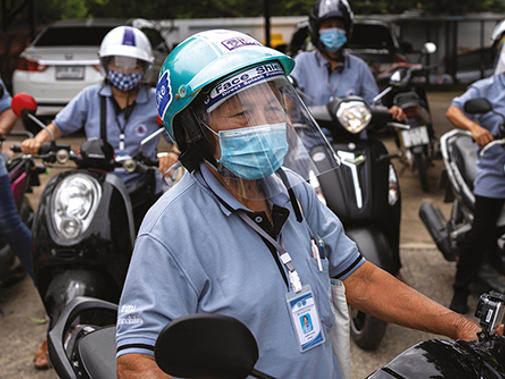Thailand is an unlikely success story in the global fight against COVID-19. It became the first country to identify a case outside China.
Since then, however, its approach has grabbed attention and headlines. ‘No one knows what Thailand is doing right but so far it’s working,’ ran one in The New York Times on 17 July, by which time almost 30,000 people had already died with the infection in the UK.
By the start of this month, Thailand had still recorded only 65 deaths from the disease.
Volunteer army
So, what has Thailand been doing so right? Two reasons for its success are its track-and-trace system and its army of more than a million village health volunteers (pictured above), says Pisonthi Chongtrakul, assistant professor in the Faculty of Medicine in Chulalongkorn University, Bangkok.
‘These are just ordinary people,’ he says. ‘They conduct home visits, provide health education, and write reports.’ That means there is one volunteer for every 67 citizens. While some personal protective equipment was initially in short supply, it had stockpiled N95 masks and anti-viral drugs.
‘As we’ve not had many patients, we’ve had very few staff contract the disease and not one has died,’ Dr Pisonthi told the Anglo-Thai Society.
We tend not to touch people where we greet themPisonthi Chongtrakul
Thai culture is also likely to have played a role, he adds. ‘We tend not to touch other people where we are greeting them. We don’t hug, we don’t kiss.’
Thais greet instead with a Wai, a slight bow. ‘We also have very few nursing homes,’ he adds.
‘We have our elderly at home with us.’ Thais were also willing to wear facemasks and stay at home without the need for a new law or system of fines.
Most of its recent case have arrived from abroad. All new arrivals must stay two weeks in quarantine. Thais can stay in free state-run quarantines.
Thais and non-Thais may also stay at their own expense in Government-approved alternative state quarantine hotels.
Any Thais who contract COVID-19 are immediately admitted for free treatment to a hospital or ‘hospitel’, one of several hotels rented by the Government for patients who are not very sick. Foreigners who test positive during quarantine are also admitted to hospital.
Lockdown eased
Its lockdown started with the closure of massage parlours, saunas, pubs, bars and boxing stadiums in March, as daily cases rose to a peak of 188.
Lockdown measures began to be eased in May with department stores and restaurants opening their doors, followed by schools, pubs, and massage parlours in July.
Despite the success so far, Thailand saw in early January a sharp increase in cases and fresh government advice to stay at home and close certain public facilities.
Doctors had previously expressed concerns about a second wave, because of a risk of illegal border crossings and a change in public behaviour following a sustained run of low case numbers last year.
‘The number of people wearing masks is dropping, you can see people gathering without social distancing at night in Bangkok,’ Dr Pisonthi says. ‘There’s still the threat that people will contact the disease, mix, and there will be a second wave.’

